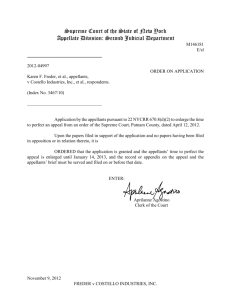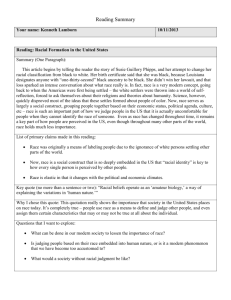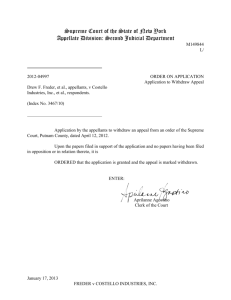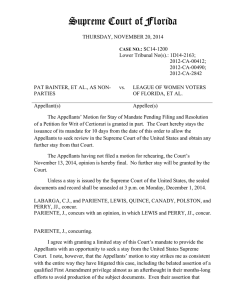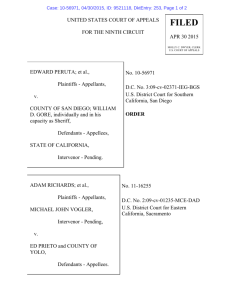Jane Doe/ 1
advertisement
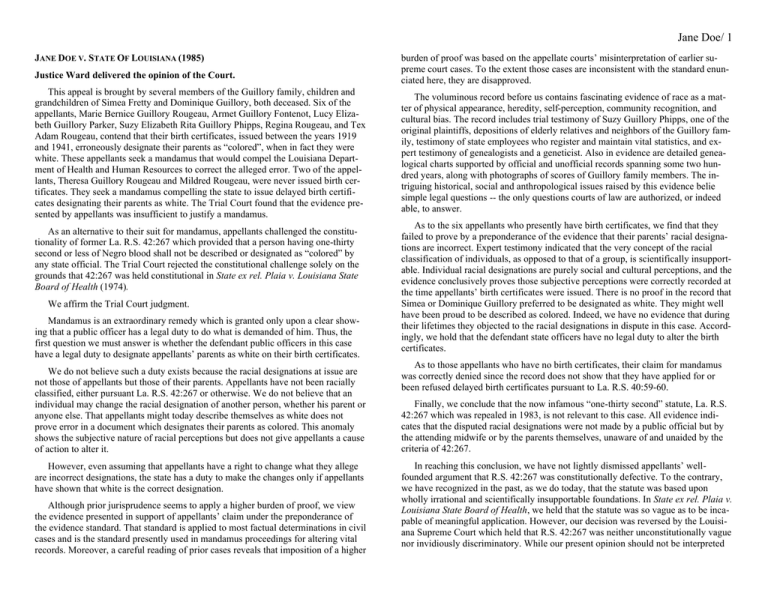
Jane Doe/ 1 JANE DOE V. STATE OF LOUISIANA (1985) Justice Ward delivered the opinion of the Court. This appeal is brought by several members of the Guillory family, children and grandchildren of Simea Fretty and Dominique Guillory, both deceased. Six of the appellants, Marie Bernice Guillory Rougeau, Armet Guillory Fontenot, Lucy Elizabeth Guillory Parker, Suzy Elizabeth Rita Guillory Phipps, Regina Rougeau, and Tex Adam Rougeau, contend that their birth certificates, issued between the years 1919 and 1941, erroneously designate their parents as “colored”, when in fact they were white. These appellants seek a mandamus that would compel the Louisiana Department of Health and Human Resources to correct the alleged error. Two of the appellants, Theresa Guillory Rougeau and Mildred Rougeau, were never issued birth certificates. They seek a mandamus compelling the state to issue delayed birth certificates designating their parents as white. The Trial Court found that the evidence presented by appellants was insufficient to justify a mandamus. As an alternative to their suit for mandamus, appellants challenged the constitutionality of former La. R.S. 42:267 which provided that a person having one-thirty second or less of Negro blood shall not be described or designated as “colored” by any state official. The Trial Court rejected the constitutional challenge solely on the grounds that 42:267 was held constitutional in State ex rel. Plaia v. Louisiana State Board of Health (1974). We affirm the Trial Court judgment. Mandamus is an extraordinary remedy which is granted only upon a clear showing that a public officer has a legal duty to do what is demanded of him. Thus, the first question we must answer is whether the defendant public officers in this case have a legal duty to designate appellants’ parents as white on their birth certificates. We do not believe such a duty exists because the racial designations at issue are not those of appellants but those of their parents. Appellants have not been racially classified, either pursuant La. R.S. 42:267 or otherwise. We do not believe that an individual may change the racial designation of another person, whether his parent or anyone else. That appellants might today describe themselves as white does not prove error in a document which designates their parents as colored. This anomaly shows the subjective nature of racial perceptions but does not give appellants a cause of action to alter it. However, even assuming that appellants have a right to change what they allege are incorrect designations, the state has a duty to make the changes only if appellants have shown that white is the correct designation. Although prior jurisprudence seems to apply a higher burden of proof, we view the evidence presented in support of appellants’ claim under the preponderance of the evidence standard. That standard is applied to most factual determinations in civil cases and is the standard presently used in mandamus proceedings for altering vital records. Moreover, a careful reading of prior cases reveals that imposition of a higher burden of proof was based on the appellate courts’ misinterpretation of earlier supreme court cases. To the extent those cases are inconsistent with the standard enunciated here, they are disapproved. The voluminous record before us contains fascinating evidence of race as a matter of physical appearance, heredity, self-perception, community recognition, and cultural bias. The record includes trial testimony of Suzy Guillory Phipps, one of the original plaintiffs, depositions of elderly relatives and neighbors of the Guillory family, testimony of state employees who register and maintain vital statistics, and expert testimony of genealogists and a geneticist. Also in evidence are detailed genealogical charts supported by official and unofficial records spanning some two hundred years, along with photographs of scores of Guillory family members. The intriguing historical, social and anthropological issues raised by this evidence belie simple legal questions -- the only questions courts of law are authorized, or indeed able, to answer. As to the six appellants who presently have birth certificates, we find that they failed to prove by a preponderance of the evidence that their parents’ racial designations are incorrect. Expert testimony indicated that the very concept of the racial classification of individuals, as opposed to that of a group, is scientifically insupportable. Individual racial designations are purely social and cultural perceptions, and the evidence conclusively proves those subjective perceptions were correctly recorded at the time appellants’ birth certificates were issued. There is no proof in the record that Simea or Dominique Guillory preferred to be designated as white. They might well have been proud to be described as colored. Indeed, we have no evidence that during their lifetimes they objected to the racial designations in dispute in this case. Accordingly, we hold that the defendant state officers have no legal duty to alter the birth certificates. As to those appellants who have no birth certificates, their claim for mandamus was correctly denied since the record does not show that they have applied for or been refused delayed birth certificates pursuant to La. R.S. 40:59-60. Finally, we conclude that the now infamous “one-thirty second” statute, La. R.S. 42:267 which was repealed in 1983, is not relevant to this case. All evidence indicates that the disputed racial designations were not made by a public official but by the attending midwife or by the parents themselves, unaware of and unaided by the criteria of 42:267. In reaching this conclusion, we have not lightly dismissed appellants’ wellfounded argument that R.S. 42:267 was constitutionally defective. To the contrary, we have recognized in the past, as we do today, that the statute was based upon wholly irrational and scientifically insupportable foundations. In State ex rel. Plaia v. Louisiana State Board of Health, we held that the statute was so vague as to be incapable of meaningful application. However, our decision was reversed by the Louisiana Supreme Court which held that R.S. 42:267 was neither unconstitutionally vague nor invidiously discriminatory. While our present opinion should not be interpreted Jane Doe/ 2 compelling governmental interest for the use of this statute. Nor do I choose to supply such an interest. Under these circumstances it is clear that the statute must fall as a violation of the equal protection clause. to imply that we are bound today by social and cultural precedent, we are nonetheless bound by legal precedent. Thus, neither the Trial Court nor this court is free to declare that La. R.S. 42:267 was, during its brief and tortured existence, unconstitutional. . Mr. ARMSTRONG, concurring in part, dissenting in part. I concur in the result reached by the majority, however, I believe that the remedy of mandamus should be available to plaintiffs and that the constitutionality of LSAR.S. 42:267 is indeed relevant. Although the majority is correct in pointing out that the plaintiffs themselves have not been specifically classified by the State, i.e., their birth certificates do not indicate the race of the child, I am compelled to point out that the society in which plaintiffs grew up, and perhaps to a lesser extent our present society, classify one according to ancestral designations, “you are what your parents are.” Since plaintiffs’ parents were designated as “colored”, plaintiffs will continue to be regarded as members of the black race by some segments of our society no matter what they proclaim themselves to be. Given this past and present reality I must disagree with the majority holding that the constitutionality of LSA-R.S. 42:267 is irrelevant. If LSA-R.S. 42:267 is constitutional, plaintiffs could demand that their parents’ racial designation be changed to white. If that statute is constitutional and the plaintiffs could prove that their parents had one-thirty second or less of “Negro blood”, then the State would be in violation of LSA-R.S. 42:267 if it maintained a designation of plaintiffs’ parents as colored. In my opinion mandamus should be available as a remedy because irrespective of who provided their parents’ racial designations, it is plaintiffs’ birth certificates and their hereditary racial designations which would be altered. Regarding the constitutionality of LSA-R.S. 42:267, the Trial Judge in his reasons for judgment stated, “As to R.S. 42:267, it has already been found constitutional by our Supreme Court, in State ex rel. Plaia v. Louisiana State Board of Health.” In that case, without subjecting the statute to strict scrutiny, the Louisiana Supreme Court reasoned that LSA-R.S. 42:267 was a definition of the term “traceable amount” and did not constitute racial classification. I respectfully disagree. LSA-R.S. 42:267 constitutes a classification in that it prohibits persons of a certain genealogical status from being designated as black. Thus, it is immaterial that no Louisiana official is required under LSA-R.S. 42:267 to actually designate any person as black -- the statute itself classifies. As a racial classification LSA-R.S. 42:267 is “suspect” and is therefore subject to strict scrutiny. When a racial classification is clear on the face of a statute, there arises a heavy burden upon the government to prove that the statute is necessary to fulfill a compelling governmental interest. In this case the State has proposed no I concur with the portion of the majority decision which holds that the Guillory sisters failed to establish by a preponderance of the evidence that their parents were white. A review of the record indicates that they simply failed to meet their burden of proof. With regard to Adam Rogeau, the record is devoid of any evidence regarding his parents’ racial designation. Since no evidence was presented to rebut the presumption contained in LSA-R.S. 40:42(A) that the racial designation in the birth certificate is correct, I would rely on that presumption and would hold that the designation is correct. Nor is Mildred Rogeau entitled to have a birth certificate issued. No evidence was presented at trial to establish her birth record. Consequently I must agree with the Trial Court’s refusal to issue a birth certificate to her. For the foregoing reasons I respectfully concur in part and dissent in part.
